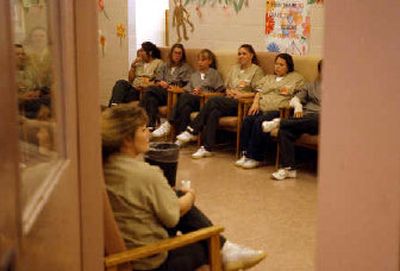Idaho wants new prisons

POCATELLO, Idaho – Idaho needs to build three new prisons at a cost of nearly $160 million, legislative budget writers were told Wednesday.
If lawmakers next winter approve the proposal, Idaho would build a 300-bed addition to its existing privately run prison near Boise; a new 400-bed prison for female offenders, whose numbers are growing at twice the rate of males; and a 1,500-bed new prison for male inmates.
“These beds are what we need over the next five years to manage prison populations safely,” state Corrections Director Tom Beauclair told the Joint Finance-Appropriations Committee, as the lawmakers gathered at the Pocatello Women’s Prison, where they took a tour and saw the crowded prison firsthand during their spring interim meeting.
Every Idaho prison is now full or overbooked – the corrections department has 360 more inmates than beds. A federal judge is considering whether to order the state to ship inmates out of state immediately to relieve overcrowding. Beauclair said even if the courts don’t force such a move, he’ll have to make it anyway by next spring. Idaho now has 6,502 prison inmates – up from 2,900 in 1994 – and expects to gain 30 more inmates a month in the next year.
“Filling up prisons to the brim and overflow may save money in the short term, but there are consequences to that,” Beauclair told the legislators grimly.
One day in April, for example, there wasn’t a single administrative segregation bed available “anywhere in the system,” Beauclair said. That meant wardens had no place to send inmates who acted up or attacked other inmates or guards.
Security staff, programming and facilities at Idaho prisons are being stretched thin, he warned. Cells are double-bunked and some inmates are even being housed in tents.
The lawmakers were stunned by the prison-building proposal.
“I think there’s other alternatives,” said Rep. Dick Harwood, R-St. Maries. “It’d be nice to do something to keep people from getting in here. That’s an issue we’ve talked about but haven’t done anything about.”
Sen. Shawn Keough, R-Sandpoint, said, “It’s depressing.” She said she’d rather see the state invest in programming and treatment to reduce recidivism to lessen the need for new prison-building. “That said, though, if we’re sending them out of state, it’s more cost-effective to build them here,” she said.
At the Pocatello prison on Wednesday, JFAC members, who are charged with writing the state budget, visited with women inmates at a facility that now houses 307 inmates. Its safe operating capacity is 279. The Pocatello prison opened in 1994 with 128 beds.
“We’ve got four to a room and they’re really little,” said Shara Bates, 24, of Coeur d’Alene, who’s been in the prison for a month and has three months to go. “We’re stuck in here all day pretty much together. The only time you get out is for school or for meals.”
Beauclair ran down the costs of sending inmates out of state and said they range from $45 to $60 per inmate, per day. Plus, those inmates lose contact with their families and the programming and treatment that tend to help them qualify for parole and for success once they’re released – which may mean they stay in prison longer or come back again.
With the high costs, Beauclair said, “Essentially what we’re doing is we’re paying for capital construction costs to another state.”
Rep. George Eskridge, R-Dover, said, “I don’t know what to think. You look at the cost to send them outside – basically, it’s (more) cost-effective to keep ‘em here. The thing I’m looking at is, how do we keep them out of here in the first place?”
Several members of the key budget-writing committee, including conservative Sens. Mel Richardson, R-Idaho Falls, and Monty Pearce, R-New Plymouth, said they’d favor alternatives to prison like electronic monitoring or community treatment programs for low-risk offenders.
“I don’t think that we have given them an alternative,” said Rep. Maxine Bell, R-Jerome, co-chairwoman of the joint budget panel. “I know the alternative’s out there, but until the policy makers choose to put it in place, what alternative do we have?”
Gov. Dirk Kempthorne hasn’t taken a position yet on the prison-building plan, according to his chief of staff Brian Whitlock. Thus far, Kempthorne has been reluctant to support new prisons, proposing instead to increase treatment programs. But tight state budgets have limited efforts in that area, though several promising new programs have started and one Corrections Department study shows recidivism has dropped slightly for first-time parolees.
“We’ll look at this request, we’ll evaluate it,” Whitlock said.
In January, Kempthorne signed an executive order and announced the formation of a new Criminal Justice Commission to look into how to reduce Idaho’s fast-growing prison population and address drugs, gangs and related issues. But six months later, the governor still hasn’t appointed the commission’s members.
Whitlock said Kempthorne is planning to revise the order to add some legislators to the commission and will re-issue the executive order, but has no time frame in mind. “That’s one of many things on the platter,” he said.
Sen. Dean Cameron, R-Rupert, the joint committee’s Senate co-chairman, said, “It’s a huge dilemma for us financially.” Idaho’s state tax revenues finally are recovering, he said, but the state has put off many pressing budget needs while it scraped through an economic downturn.
“We’ve got a whole lot of problems we’re going to be faced with, and this is towards the top of the list,” he said.